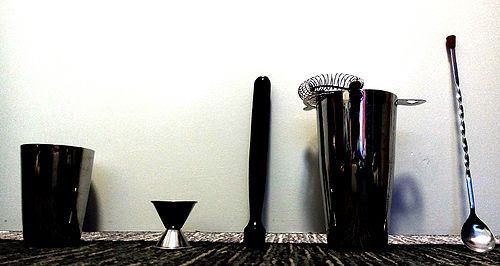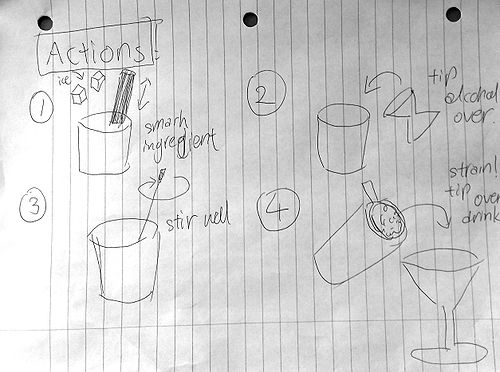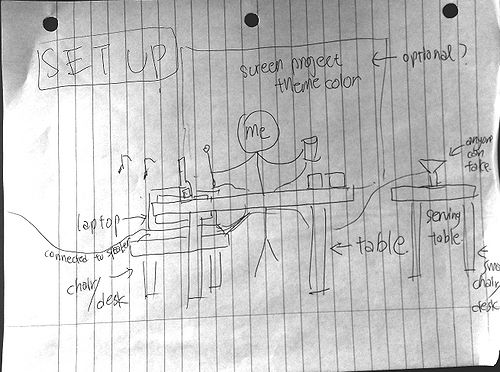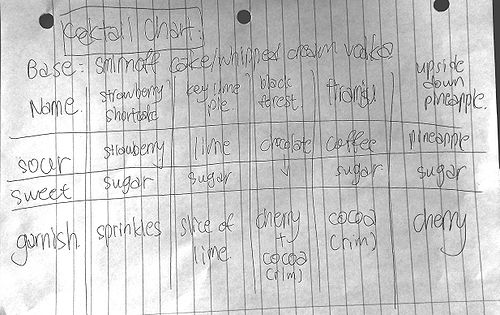Musicatini
From CCRMA Wiki
Contents
Drawings
The tools
Actions involved when mixing
Sensor to tool mapping
Stage set-up
Cocktail design chart
Sound design chart
Cocktail Design
- Strawberry Shortcake
- Recipe: Vodka + Strawberry + Sugar + Sprinkles
- Backing Track Inspiration: Invader Invader - Kyary Pamyu Pamyu
- Sound Design Theme: Sweet, cute, rainbow
- Key Lime Pie
- Recipe: Vodka + Lime + Sugar + Slice of Lime
- Backing Track Inspiration: Circle Game - Joni Mitchell
- Sound Design Theme: Plain, peaceful, happy
- Black Forest
- Recipe: Vodka + Chocolate + Cherry + Cocoa (powder)
- Backing Track Inspiration: Una Mattina - Ludovico Einaudi
- Sound Design: Dark, sweet, saccharine
- Tiramisu
- Recipe: Vodka + Coffee + Sugar + Cocoa (powder)
- Backing Track Inspiration: Caffeine - Yoseob
- Sound Design: Bittersweet, sophisticated
- Upside Down Pineapple
- Recipe: Vodka + Pineapple + Sugar + Cherry
- Backing Track Inspiration: Hawaiian Rollercoaster Ride
- Sound Design: Hawaiian, beach, upbeat
3 Lists
Things you need to have done for a minimal viable product
- Each cocktail: the drink + background track + motion/sounds
Things that you want to have done by the final deadline
- Fine tune program so that sounds produced are coherent and nice
- Target 5 cocktails
Things that would be nice to have if you had unlimited time.
- Design more cocktails
List of Materials
- Sensors
- Accelerometer
- Strip sensor
- Tilt ball switch
- Alcohol and other ingredients, cups
- Electronic parts connecting sensor/clips to computer
- Bartending Kit
- Arduino + Laptop
- Background track (part of sound design)
Scheule/Progress
Planned Schedule
- (11/10): order LED ice cubes/cups, map sensor to tool
- (11/13): design the drinks (recipe + background + desired motion/sound)
- (11/16~11/26): sound design, practice, prototype tools
- (11/30): prepare ingredients, rehearse
- (12/1): dress rehearsal
- (12/3): final presentation
- (12/4): documentation
Progress Notes
- (11/17): Basic design complete (need to experiment with sound)
- (11/17): Two accelerometers with extensions complete and tested - find out how to connect all to same Arduino
- (11/17): Tilt ball tested - find out how to extend + connect to same Arduino
- (11/17): Softpot tested - find out how to extend + connect to same Arduino
Similar Examples
Uses accelerometer to measure tilt angle.
The Grip Maestro is similar - uses an existing object + sensors
Uses a lot of small objects for interaction





